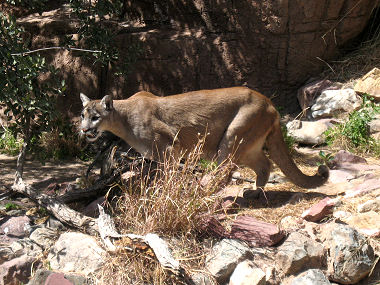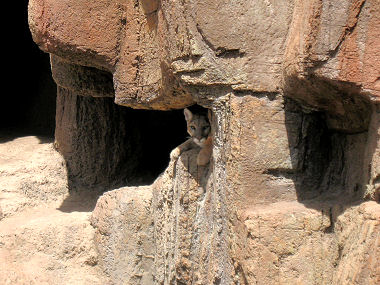The Mountain Lion (also known as the Cougar, Panther or Puma)
 is
the largest cat in the Sonoran Desert. Females typically weight about 75
pounds, while the males can weigh up to 145 pounds. Kittens are born with
spotted coats, which they keep for about the first three months. Adults have
tawny brown coats and a heavy tail with a black tip. They can grow to 6 feet in
length, not including their tail which can add another 3 feet. Mountain Lions
are found in a variety of habitats including: mountain forests, riparian
canyons and Sonoran Desert uplands (basically any area which supports
sufficient populations of prey species). is
the largest cat in the Sonoran Desert. Females typically weight about 75
pounds, while the males can weigh up to 145 pounds. Kittens are born with
spotted coats, which they keep for about the first three months. Adults have
tawny brown coats and a heavy tail with a black tip. They can grow to 6 feet in
length, not including their tail which can add another 3 feet. Mountain Lions
are found in a variety of habitats including: mountain forests, riparian
canyons and Sonoran Desert uplands (basically any area which supports
sufficient populations of prey species).
|
I have yet to see a Mountain Lion in the
wild. The photos on this page were taken at the Arizona Sonoran Desert
Museum. |
Mountain Lions are carnivorous and mainly feed on deer, but will
also hunt javelina, bighorn sheep, jack rabbits, porcupines, squirrels and
other small mammals. The lions hunt by slowly sneaking up on its prey. They
need to get close to their prey before pouncing due to the fact that they have
a small heart and lung for their size, making them unable to run for long
distances. The cats breed at 2-3 years of age and produce a litter of 3-4
kittens. The kittens remain with the mother for about a year, after which time
they head off to find their own territory. Historical studies have shown the
cats each had ranges of 25 square miles, but human encroachment has begun
crowding the animals into smaller and smaller areas, increasing competition and
forcing them into contact with people on a more frequent basis.
 |

